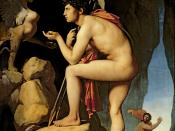The Mysteries of Fate
Among the first thing a historian discovers in his study of early civilization are records of
people's belief, or faith, in powers greater than themselves, and their desire to understand what causes
these powers to act. People everywhere wonder about the marvelous things in the sky and on the earth.
What makes the rain? How do the plants and animals live and grow and die? Why are some people lucky
and others unlucky? Some believe in free will while others believe in fate or destiny. In the play Oedipus
the King by Sophocles, Oedipus was a true victim of fate.
Gods and goddesses were believed to be responsible for the wonders of science, and the vagaries
of human nature; therefore, according to the facts of this story, Oedipus was a true victim of fate for
several reasons. Laius and Jocasta, the childless king and queen of Thebes, were told by the god Apollo
that their son would kill his father and marry his mother (page 56).
A son was born to them, and they
tried to make sure that the prophecy would not come true. They drove a metal pin through the infants
ankles and gave it to a shepherd, with instructions to leave it to die. The shepherd pitied the little infant
so he gave the child to another shepherd. This shepherd gave the baby to a childless king and queen of
Corinth, Polybus and Merope. This royal couple named the boy Oedipus, which in its Greek form
Oidipous means 'swollen foot.' Oedipus was brought up believing that Polybus and Merope were his real
parents, and Lauis and Jocasta believed that their child was dead and the prophecy of Apollo was false.
Many years later, he was told by a drunk man at a...


